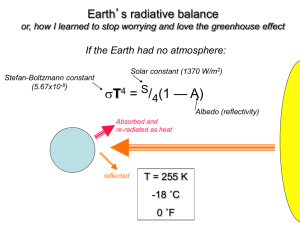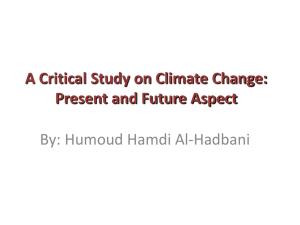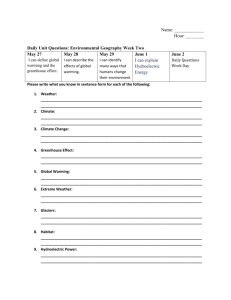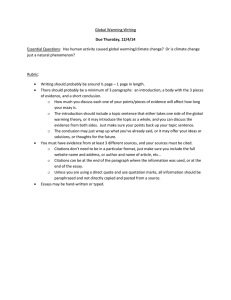The Earth in 2050. – will humanity follow the Climate change
advertisement
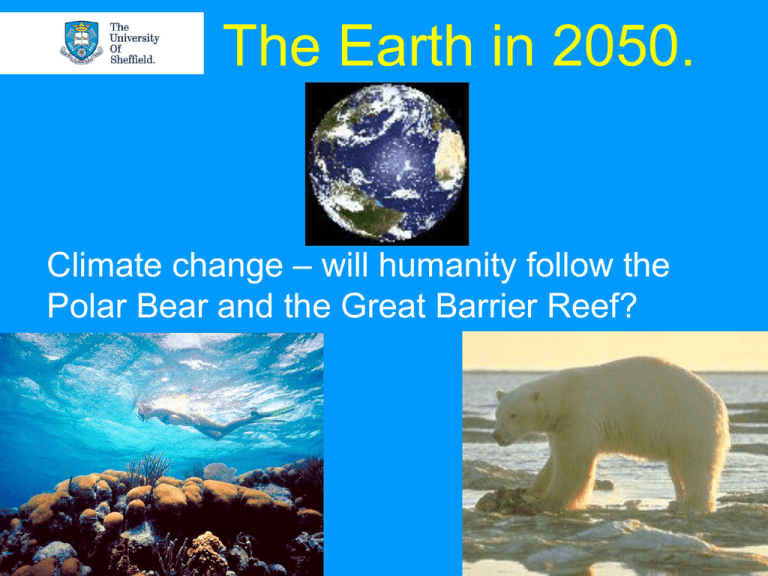
The Earth in 2050. Climate change – will humanity follow the Polar Bear and the Great Barrier Reef? Global Warming – the measurements Global surface air temperature Pattern of change Local Change Sheffield annual mean temperature 10 9 annual meant 8 7 18 83 18 93 19 03 19 13 19 24 19 34 19 44 19 54 19 65 19 75 19 85 19 95 temperature (C) 11 year No data Global Warming – context over last 1000 years Global surface air temperature reconstructions over the last millennium …. And longer Other changes Arctic sea-ice extent The Climate System The Climate System (Naturally) The Climate System (anthropogenically) Solar variability Relative Sunspot number Solar Constant (scaled to satellite observation ) Volcanic Record from Greenland Ice Core Atmospheric gases Monthly average atmospheric CO2 (Mauna Loa observatory, Hawaii) Monthly average values of atmospheric methane, California The Greenhouse Effect Land Cover Post-glacial maximum forest cover (similar to pre-industrial) Current forest cover Model “hindcast” of climate change since 1890 Primary Energy Consumption (kW/person) 100 Norway 10 Russia UK 1 China USA France Brazil India 0.1 0.01 100 1000 10000 100000 GDP ($/person/year) Wealth and energy consumption are related- as individuals get richer their lifestyles have increased energy demand. Future Global Temperature? Future Global Temperature? And Rainfall Future Global Temperature? A2 B2 Future Global Temperature? Scenario CO2 Even eventual CO2 decreases lead to global warming The regional picture in 2070-2100 compared to 1961-90 Annual mean temperature change averaged across all models (colour;oC) Range of uncertainty (blue line; oC) Range/(standard deviation) (green) Polar Bears in 2050? • Depend on sea-ice for hunting seals and land for winter dens • There could be no summer sea-ice by 2050 • Interval of post-den starvation gets longer – is it sustainable? Great Barrier Reef in 2050? • Major bleachings (coral dieback) have occurred every few years during periods of high sea temperature • A permanent temperature rise of 1-2oC could kill the coral permanently 2002 The UK in 2100? • Very Likely ~ 2-4oC warmer • Very Likely 2-7% wetter, concentrated in stormier autumn and winter • Very Likely a sea level rise of 0.11-0.77 m • Very Likely a rise in oceanic pH • But less warming than similar latitudes in the Northern Hemisphere because of a predicted slowdown in the Gulf Stream, which has a very small probability of being abrupt • Global warming at the end of the last glaciation was the spark for civilisation • But facing unprecedentedly rapid change, with a global population perhaps 1000 times greater • Predictions will improve – next IPCC report out this month! • But some change is now inevitable so the challenge is to mitigate change and adapt

